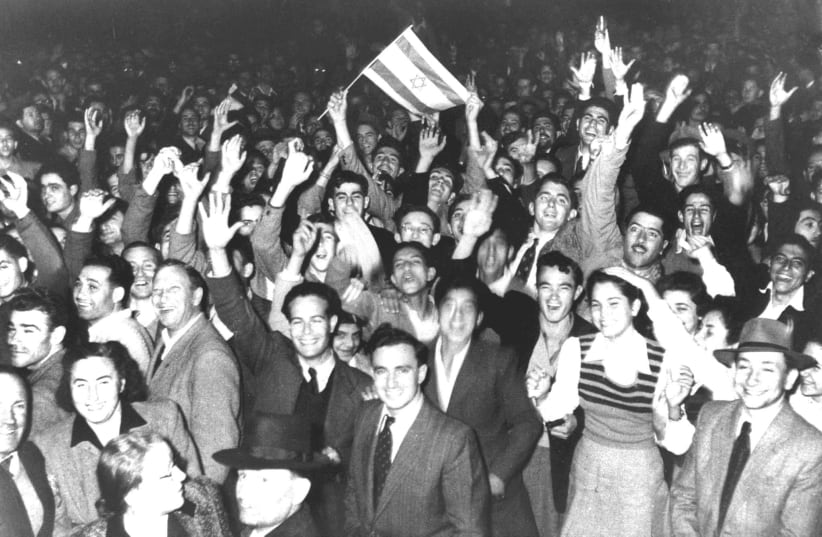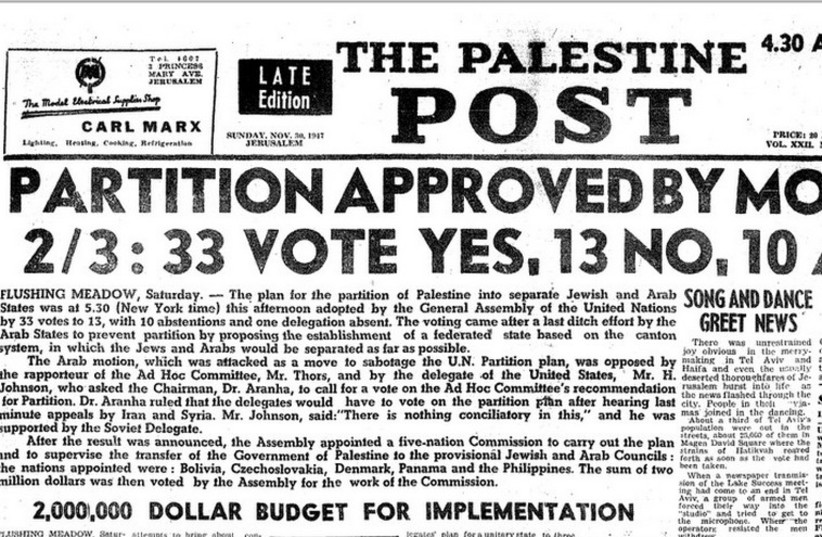On Monday this week we marked 74 years since the United Nations’ decision to partition Palestine into two states – a Jewish state (Israel) and an Arab state (Palestine). Israel’s Declaration of Independence proclaims: “On the 29th November, 1947, the United Nations General Assembly passed a resolution calling for the establishment of a Jewish State in Eretz Israel; the General Assembly required the inhabitants of Eretz Israel to take such steps as were necessary on their part for the implementation of that resolution. This recognition by the United Nations of the right of the Jewish people to establish their state is irrevocable. This right is the natural right of the Jewish people to be masters of their own fate, like all other nations, in their own sovereign state.”
The Palestinian people rejected the UN decision, but 40 years later in their own Declaration of Independences they wrote: “Despite the historical injustice inflicted on the Palestinian Arab people resulting in their dispersion and depriving them of their right to self-determination, following upon UN General Assembly Resolution 181 (1947), which partitioned Palestine into two states, one Arab, one Jewish, it is this resolution that still provides those conditions of international legitimacy that ensure the right of the Palestinian Arab people to sovereignty.” Take notice that the Palestinian declaration correctly mentions the establishment of two states, whereas the Israeli declaration only mentions the Jewish state.
Over the years, November 29 has become the International Day of Solidarity with the Palestinian People. The United Nations website on the International Day of Solidarity with the Palestinian People states: “In 1977, the General Assembly called for the annual observance of 29 November as the International Day of Solidarity with the Palestinian People. On that day, in 1947, the Assembly adopted the resolution on the partition of Palestine… The resolution on the observance of the International Day of Solidarity with the Palestinian People also encourages Member States to continue to give the widest support and publicity to the observance of the Day of Solidarity… International days and weeks are occasions to educate the public on issues of concern, to mobilize political will and resources to address global problems and to celebrate and reinforce achievements of humanity. The existence of international days predates the establishment of the United Nations, but the UN has embraced them as a powerful advocacy tool.”
This is a day that should actually become a national holiday in both Israel and Palestine. It is a day when the international community recognized that there are two people living in the land between the Jordan River and the Mediterranean Sea and that both of the peoples have the right of self-determination. The UN decision also included some other very important steps, that unfortunately were never fully implemented, such as:
“In so far as Holy Places are concerned, the liberty of access, visit and transit shall be guaranteed, in conformity with existing rights, to all residents and citizens of the other State and of the City of Jerusalem, as well as to aliens, without distinction as to nationality, subject to requirements of national security, public order and decorum.”
“Palestinian citizens residing in Palestine… as well as Arabs and Jews who, not holding Palestinian citizenship, reside in Palestine… shall, upon the recognition of independence, become citizens of the State in which they are resident and enjoy full civil and political rights. Persons over the age of eighteen years may opt, within one year from the date of recognition of independence of the State in which they reside, for citizenship of the other State, providing that no Arab residing in the area of the proposed Arab State shall have the right to opt for citizenship in the proposed Jewish State and no Jew residing in the proposed Jewish State shall have the right to opt for citizenship in the proposed Arab State. The exercise of this right of option will be taken to include the wives and children under eighteen years of age of persons so opting… Arabs residing in the area of the proposed Jewish State and Jews residing in the area of the proposed Arab State who have signed a notice of intention to opt for citizenship of the other State shall be eligible to vote in the elections to the Constituent Assembly of that State, but not in the elections to the Constituent Assembly of the State in which they reside.”
The resolution also called for the establishment of an economic union between the two states. The partition resolution has always been a cornerstone of the Israeli-Palestinian peace process. The failure of the process has not removed the basic logic behind the concept of partition – the fundamental need of both peoples for self-determination which is what I call the need for a territorial expression of their identity within the same piece of territory that one side calls the Land of Israel and the other side calls Palestine. The original resolution from 74 years ago included a map which would have granted each side large pieces of the territory with very large minorities of the other side within its territory. Eventually, had the resolution been accepted and implemented we would have probably ended up with two binational states.
The economic union between them could have led to some form of a larger union of the two states, but of course, none of that happened. Seventy-four years later we are left with two peoples who both still demand the right to self-determination, but only one of the people has succeeded to implement that right. Even if the Oslo peace process failed, and many people, including myself question the feasibility of the two states solution, we will always come back to the basic needs and demands of both sides to have the ability to determine their own identity and to shape their own future on a piece of land between the river and the sea.
The inequality and the imbalance of power and wealth between the two people are what will keep this conflict alive for many more years. That is what we need to address and to find constructive and positive new ways for engagement. Perhaps next year on November 29 both sides can declare the day a national holiday in recognition of not only their own rights, but also in recognition of the rights of the other people here.
The writer is a political and social entrepreneur who has dedicated his life to the State of Israel and to peace between Israel and her neighbors. He is now directing The Holy Land Investment Bond.

